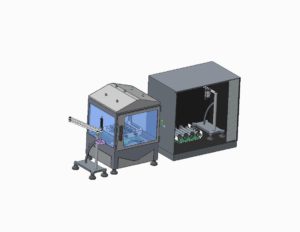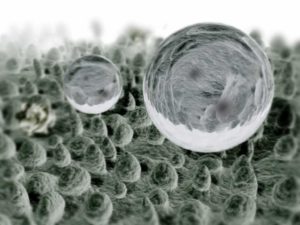A European team of researchers led by the University of Parma, together with a network of partner companies, including the company of Vicenza Ecor Research, is developing the first fluid-repellent, antibacterial, metal surface in the world, bringing us one step closer to production of appliances and machinery for the food industry self-cleaning.
The innovation aroused within the TresClean project (High throughput laser texturing of self-cleaning and antibacterial surfaces) promoted in the framework of the community program Horizon 2020. The team was inspired by the mechanisms with which some plants, such as Lotus, make their leaves fluid-repellent. Leaves surfaces suggested the idea that it is possible to create structures that can detect new functions such as the preventions of bacterial adhesion. The application of this concept to metal elements creates a wide perspective of implementation for all those components sensitive to bacterial contamination, ranging from food industry to domestic and biomedical application.
Revolutionary solution
TresClean team uses high-average power ultrashort-pulsed lasers to create on metal sheets a surface topography conceived to duplicate the Lotus leaf surface and to prevent liquid adhesion. This topography is able to capture miniature pockets of air that minimize the contact area between the surface and liquids. Metal surfaces undergo a specific laser marking process, using innovative optical devices for common industrial use: ultrashort-pulsed lasers, but with high-average power are used in combination with high-performance scanning heads by utilizing an innovative beam delivery method enabling movements of up to 200 m/s. In this way, technology developed by TresClean is able to perform stainless steel surface marking of 500 square cm in less than 30 minutes: if compared with the technology existing in early 2015, TresClean’s solution could be 156 times quicker.
European research group
The project received funds amounting to 3.3 million euro in the framework of the calls for H2020 Industrial Leadership program with the support of Photonics Public Private Partnership Support. The consortium is composed by the University of Parma as coordinator, the Italian company of Schio (Vicenza) Ecor Research, Universitaet Stuttgart (Germany), Centre Technologique Alphanov (France), RAYLASE AG (Germany), BSH Electrodomesticos Espana SA (Spain) and Kite Innovation Limited (United Kingdom). Ecor Research has contributed with its expertise in the field of characterization and functionalization of surfaces and in the design of a functional testing system that made it possible to analyse the properties of the treated surfaces with respect to the stated functions.
A turning point solution
 Professor Romoli, Project Coordinator of TresClean, estimates that TresClean could have its products ready within 2 years. TresClean hopes to make a significant impact on productivity: «Vats in milk factories need to be cleaned every 6-8 hours to avoid the exponential growth of bacteria. This hinders usage and therefore affects output. By saving hours per day in cleaning, it will yield an efficiency improvement stemming from fewer sterilization cycles and less cleaning time within production as a whole. This will also reduce energy consumption as a result of fewer cleaning phases making food production quicker, safer and more profitable». Professor Romoli sees long-term possibilities and implications for sectors besides food farming industry.
Professor Romoli, Project Coordinator of TresClean, estimates that TresClean could have its products ready within 2 years. TresClean hopes to make a significant impact on productivity: «Vats in milk factories need to be cleaned every 6-8 hours to avoid the exponential growth of bacteria. This hinders usage and therefore affects output. By saving hours per day in cleaning, it will yield an efficiency improvement stemming from fewer sterilization cycles and less cleaning time within production as a whole. This will also reduce energy consumption as a result of fewer cleaning phases making food production quicker, safer and more profitable». Professor Romoli sees long-term possibilities and implications for sectors besides food farming industry.




